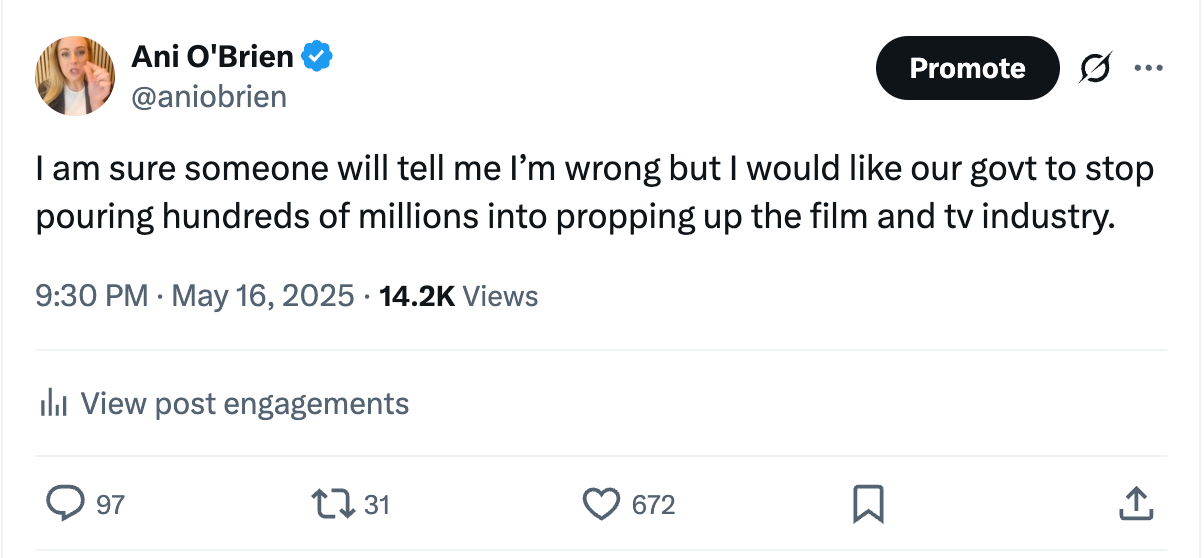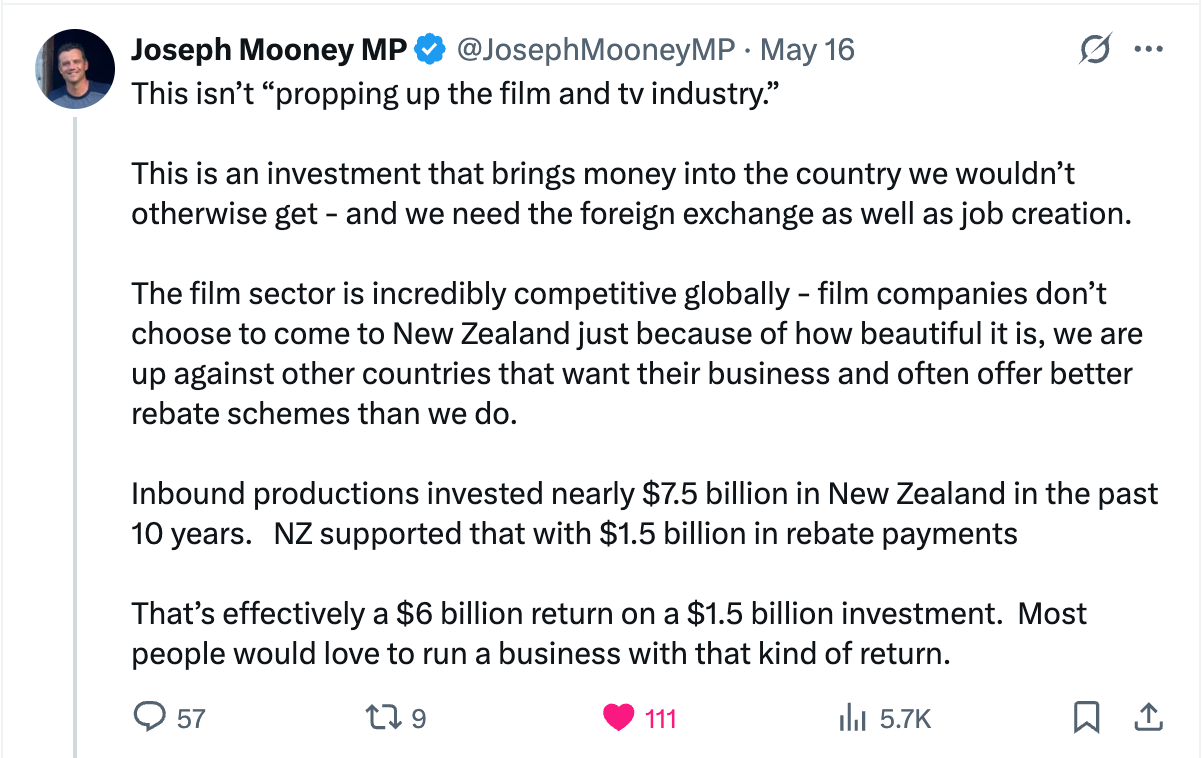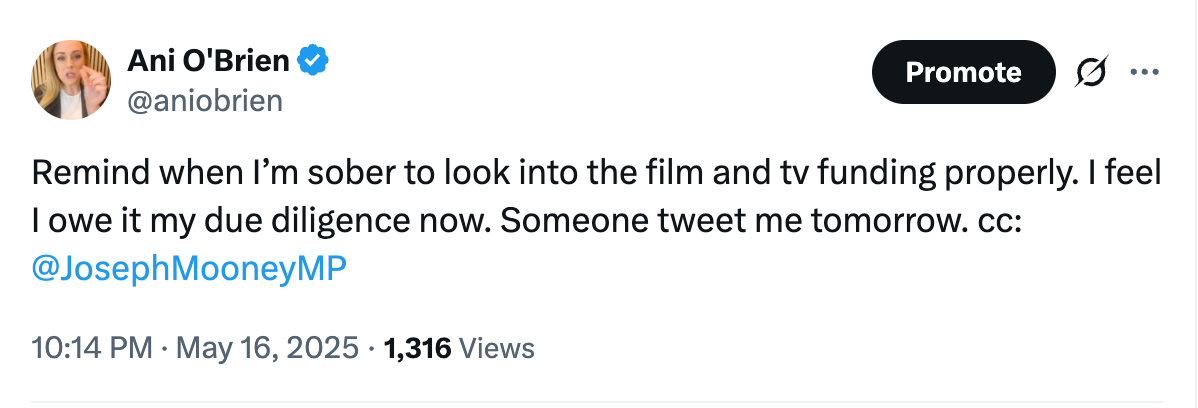On Friday night, having imbibed a few wines I strayed onto X to unwisely engage in some (slightly drunk) opinion sharing. I tweeted:

Click to view
I wish I had been in the right frame of mind to engage as it stimulated some interesting perspectives. National MP Joseph Mooney replied defending his Government’s decision to allocate an additional $577 million to the International Screen Production Rebate (ISPR) scheme, bringing total funding to $1.09 billion over the next four years.

Click to view
Proponents, like Joseph, argue that this investment is crucial for maintaining New Zealand's competitiveness in the global film industry. The New Zealand screen sector employs thousands of people and generates billions annually, with a significant portion of revenue stemming from international productions.
The ISPR offers a 20% cash rebate on qualifying production expenditures, with an additional 5% for productions exceeding $30 million that meet specific criteria . This incentive structure aims to attract high-budget films and television series, thereby stimulating economic growth and job creation.
I do note, that Joseph’s argument does reflect the lines of his party as one would expect. He is expected to promote the policy of the Government. Nicola Willis’ press release is a likely source for the statistics he is sharing.
However, the scheme has plenty of opponents too. Top economist Eric Crampton responded to Joseph Mooney’s response to my X post:

Click to view
Before the announcement from the Finance Minister, Eric was already arguing for a “arms control treaty” for the film industry globally.
“If every country could agree to stop subsidising film productions, Hollywood’s overall spending would decrease. No country’s industry would take a disproportionate hit. But no country with substantial film subsidies wants to be first to disarm.”
He was understandably disappointed with Nicola’s support for the continuance of big rebates. His view was supported by another top economist, Michael Reddell who referred to the announcement as “pay equity for James Cameron”.

Click to view
Having promised to look into the matter further and when sober, I have been trying to figure out where I sit on the matter beyond a knee-jerk opposition to the scheme.

Click to view
Critics, like Michael and Eric, quite rightly question the prudence of such substantial public expenditure, especially during times of supposed fiscal constraint. I can understand the apprehension that the rebates disproportionately benefit large, foreign, production companies, who profit off the global competition between governments to attract filmmakers. But does this determination to attract international productions overshadow domestic storytelling and limit opportunities for local filmmakers?
Some economists question the efficacy of such substantial public investment in the film industry. All the way back in 2013, Gareth Morgan was criticising this, suggesting that “increasing rebates without clear evidence of net positive returns could lead to greater losses, likening it to "Muldoonist Think Big" strategies that have historically been economically unsound.”1
James Ross from the New Zealand Taxpayers’ Union was also scathing of Government interventions in the film sector in the days prior to the 2025 film sector announcement:
“Claims that movies boost tourism don’t stack up — the gains are inconsistent and nowhere near worth the cost. We’re not building an industry — we’re stuck in a global bidding war. US states alone have spent $25 billion chasing Hollywood. New Zealand now has the perfect opportunity to step away. Let’s call ‘cut’ on this failed fantasy and stop throwing good money after bad.”
On the other hand, writing for the New Zealand Herald, Fran O’Sullivan backed the Finance Minister’s move.2 Her headline read: “Nicola Willis’ film industry backing shows Budget’s economic growth focus”.
O’Sullivan reminds readers that current economic conditions and the various shocks being generated by a certain wild card in the White House, have made the arguments around this more complex. The New Zealand Government's move can be seen, in part, as a strategic response to the United States' proposed 100% tariffs on foreign films, for example.
"We are sending a clear message to the world: New Zealand is the best place in the world to make movies. Bring your productions here to take advantage of our talent and locations," - Finance Minister Nicola Willis.
The $577 million boost to the ISPR scheme underscores the Government's commitment to sustaining and growing New Zealand's film industry. This is despite Nicola Willis acknowledging that "industry incentives are not generally our favoured approach”. While the economic rationale is compelling, it is crucial to address concerns regarding public spending priorities.
Doing my due diligence has resulted in more confusion the clarity. I found myself agreeing with Joseph Mooney’s arguments, only to be persuaded by Eric and Michael of the opposite. Fran O’Sullivan makes a good point about the need for growth and Eric Crampton’s “arms control treaty” sounds like a good idea.
So I can only apologise that I find it impossible to reach a conclusion and pick which side I support. What do you think? Film subsidies - yay or nay?
References:
1 https://www.interest.co.nz/opinion/67907/gareth-morgan-very-sceptical-benefits-subsidising-hollywood-and-suggests-better
2 https://www.nzherald.co.nz/business/companies/media-marketing/nicola-willis-film-industry-backing-shows-economic-growth-focus-in-the-budget-fran-osullivan/ZFSNXFJVGRFAROT6IMJHQOO3LM/
Ani O'Brien comes from a digital marketing background, she has been heavily involved in women's rights advocacy and is a founding council member of the Free Speech Union. This article was originally published on Ani's Substack Site and is published here with kind permission.


7 comments:
Can someone list the $7.5 million in investment in our country from this industry.What are the tangible assets? Do they produce a self-sustaining business or income stream for the future?
Sectors that require subsidies should be made to do the numbers and come up with an end date. A point at which they will become self funding. If they are unable to do this, they are expecting to suck on taxpayers money forever. They have no need to ever improve. Just demand more.
Of course the film industry does give out MP's the opportunity to have glitzy photo opportunities with the rich and famous at our expense. So neither side are likely to want to give up subsidies, a spending both left and right can support at our expense.
Likey a better R.O.I by offering donald gump and netanyobbo square 365km for Palestinians. Yobbo might even fence/wall it?
For decades the NZ taxpayers have subsidized the Tiwai aluminum smelter to protect a few thousand jobs in Invercargill, playing an international fiscal game.
I can't see the difference with the NZ film industry.
Not bagging Southlanders, it's just the geography.
Hawkes Bay currently has many farmers and producers devastated by Gabrielle and trying to get back on their feet.
These people produce returns for the country.
I would love to see them given a temporary leg up and get them back in to production but the best they can get is a loan.
May be the film industry should be given a loan that they can pay back when they make millions.
Personally I would prefer to support movies subsidy , than Paris Accord , Net Zero subsidy/loss. There is prima facie evidence the world has appreciated movies made in NZ. ie Lord of the Rings. However, NZ has to cut the deficit so probably both should go.
Point of Order Anon- 9:50am Tiwai Smelter has not been subsidized as they built they Manapouri Power Station to smelt aluminium in Southland and no other reason . Nothing to do with gepography , but plenty to do with making exports by using water expediently .
Post a Comment
Thank you for joining the discussion. Breaking Views welcomes respectful contributions that enrich the debate. Please ensure your comments are not defamatory, derogatory or disruptive. We appreciate your cooperation.